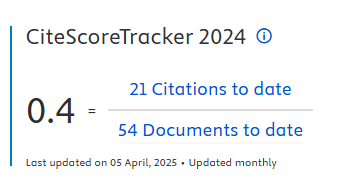Use of Artificial Intelligence – AI
The Position of the International Journal of Innovation – IJI on the Use of Artificial Intelligence – AI
We are providing guidelines on the use of Artificial Intelligence (AI), as established by the International Journal of Innovation (IJI). The purpose of these guidelines is to guide authors and researchers on the responsible and ethical use of AI tools in their publications.
According to IJI recommendations, it is essential that authors take full responsibility for the content of their studies, including parts generated by AI tools. These guidelines emphasize that AI tools do not meet authorship requirements, as they cannot assume legal responsibilities or manage copyright or conflicts of interest.
We believe that following these guidelines is important to maintain the integrity and credibility of the published research. We invite all authors to read these guidelines carefully to ensure compliance with the ethical and publication standards established by IJI.
Examples of Permissions for the Use of Artificial Intelligence
- Translation and Language Correction: AI tools are useful for translating texts into different languages and correcting grammar, punctuation, and style errors, especially for authors who are not native speakers of another language.
- Transcription: They can be used to transcribe interviews or spoken content.
- Programming Assistance: AI tools help in correcting and adjusting programming commands.
- Research: They can serve as efficient search tools to gather information and relevant references.
These applications are considered support tools to increase productivity and ensure clarity and precision in academic writing. However, it is important that the use of such tools is declared transparently in the study.
Examples of Restrictions on the Use of Artificial Intelligence
- Authorship: AI tools should not be credited as authors in academic articles. All content generated by AI must be attributed to a responsible human author.
- Content Creation: It is not allowed to use AI to generate significant parts of the study, such as developing arguments, conducting data analysis, or interpreting results.
- Data Analysis: Data analyses or result interpretations should be conducted by researchers and not by AI.
Security and Confidentiality (peer review)
Avoid including confidential data in AI tools, as some platforms may store and use these data. Maintaining the integrity and confidentiality of research data is very important. By following these guidelines, researchers can use AI tools appropriately, maintaining ethical standards and the integrity of academic publications.
Use Statement
When AI tools are used in research and study preparation, authors must explicitly declare their use. This declaration should be informed in the methodology section or a similar section of the academic work. Specifically, authors must inform:
- Which AI tools were used: include the version of the tools, as these can change rapidly in terms of scope and accuracy, and for what purpose they were employed.
- How the tools were used: include details about prompts, usage context, and date.
Furthermore, it is necessary to acknowledge and declare possible limitations and biases of the AI tools used. If the information is extensive, it is recommended to include only the essentials in the body of the text, referencing the complete content in an appendix.
References
COPE - Committee on Publication Ethics. https://publicationethics.org/cope-position-statements/ai-author
Instituto de Investigación en Ciencias de la Administración - Universidad Nacional Del Sur. Lineamientos de uso de inteligencia artificial generativa en trabajos académicos. Bahía Blanca - Argentina, 22 de mayo de 2024.
Taylor & Francis. (2023). Taylor & Francis Clarifies the Responsible use of AI Tools in Academic Content Creation. Recuperado de https://newsroom.taylorandfrancisgroup.com/taylor-francis-clarifies-the-responsible-use-of-ai-tools-in-academic-content-creation/







